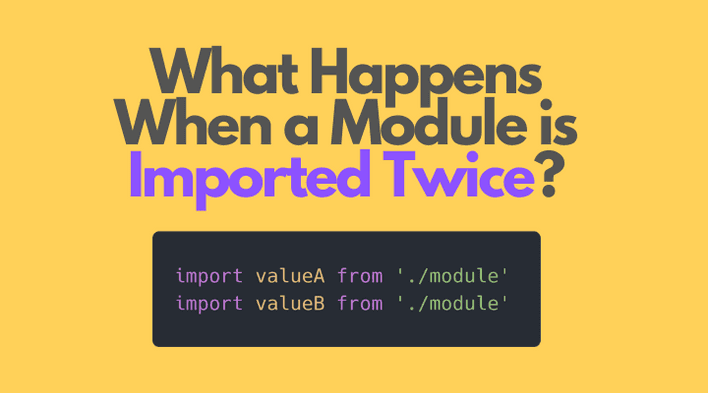Let's start the post with a question.
The ES2015 module named increment contains the following code:
// increment.jslet counter = 0;counter++;export default counter;
Then inside of another module, consumer, the above module increment is imported 2 times:
// consumer.jsimport counter1 from './increment';import counter2 from './increment';counter1; // => ???counter2; // => ???
The question is: when the consumer module runs, what is the content of variables counter1 and counter2?
To answer the question, first, you need to understand how JavaScript evaluates and imports modules.
1. Module evaluation
A good way to understand how the internals of JavaScript are working is to look at the specification.
In terms of the specification, every JavaScript module is associated with a Module Record. The Module Record has a method Evaluate(), which evaluates the module:
If this module has already been evaluated successfully, return undefined; [...]. Otherwise, transitively evaluate all module dependencies of this module and then evaluate this module.
Thus, the same module is evaluated just once.
Unfortunately, the question doesn't end here. How to be sure that calling 2 times the import statement with the same path returns the same module?
2. Resolving the imports
The responsibility of associating the path (also named specifier) to a concrete module is performed by HostResolveImportedModule() abstract operation.
import module from 'path';
According to the specification:
The implementation of HostResolveImportedModule must conform to the following requirements:
- The normal return value must be an instance of a concrete subclass of
Module Record. - If a
Module Recordcorresponding to the pairreferencingScriptOrModule, specifierdoes not exist or cannot be created, an exception must be thrown. - Each time this operation is called with a specific
referencingScriptOrModule, specifierpair as arguments it must return the sameModule Recordinstance if it completes normally.
Let's review what happens, in a human-readable manner.
HostResolveImportedModule(referencingScriptOrModule, specifier) is an abstract operation that returns a module that corresponds to referencingScriptOrModule, specifier:
- The parameter
referencingScriptOrModuleis the current module, i.e. the module that makes the import. - The parameter
specifieris the string that corresponds to the path of the module within theimportstatement.
Finally, HostResolveImportedModule() says that when importing modules from the same path, the same module is imported:
import moduleA from 'path';import moduleB from 'path';import moduleC from 'path';// moduleA, moduleB and moduleC are equalmoduleA === moduleB; // => truemoduleB === moduleC; // => true
What's interesting is that the specification says the host (the browser, Node, or anything that tries to run JavaScript) must provide the concrete implementation of HostResolveImportedModule().
3. The answer
After reviewing the specification, you know that a JavaScript module is evaluated once. Also, when importing modules from the same path, the same module instance is returned.
Let's return to the question.
The increment module is always evaluated once:
// increment.jslet counter = 0;counter++;export default counter;
No matter how many times the increment module is being imported, counter++ statement is executed just once. The default exported counter variable has the value 1.
Now looking at the consumer module:
// consumer.jsimport counter1 from './increment';import counter2 from './increment';counter1; // => 1counter2; // => 1
import counter1 from './increment' and import counter2 from './increment' have the same path: './increment'. Thus you import the same module instance.
Finally, counter1 and counter2 variables inside the consumer both equal to 1.
4. Conclusion
Just by exploring the proposed simple question, you find the details of how JavaScript modules are evaluated and imported.
The rules are quite simple: the same module is evaluated only once, in other words, the module-level scope is executed just once. If the module, once evaluated, is imported again, it's second evaluation is skipped and the resolved already exports are used.
If a module is imported multiple times, but with the same specifier (i.e. path), the JavaScript specification guarantees that you'll receive the same module instance.


